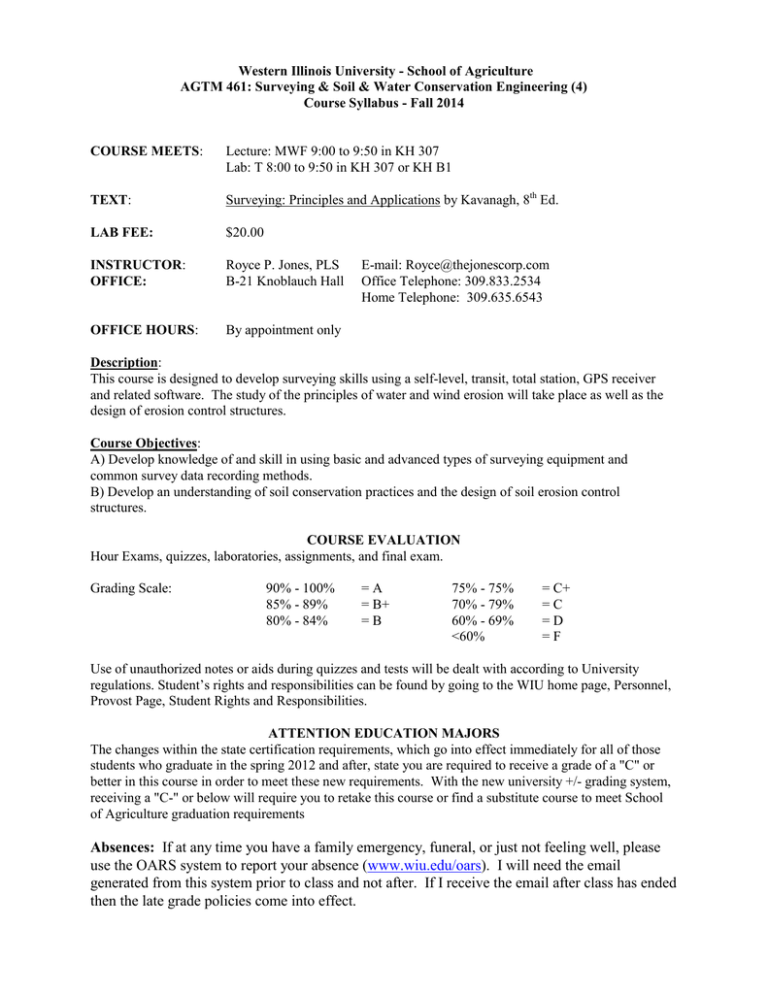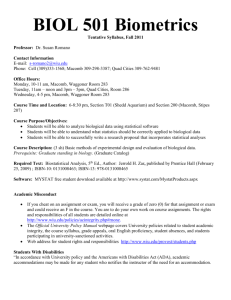Western Illinois University - School of Agriculture
advertisement

Western Illinois University - School of Agriculture AGTM 461: Surveying & Soil & Water Conservation Engineering (4) Course Syllabus - Fall 2014 COURSE MEETS: Lecture: MWF 9:00 to 9:50 in KH 307 Lab: T 8:00 to 9:50 in KH 307 or KH B1 TEXT: Surveying: Principles and Applications by Kavanagh, 8th Ed. LAB FEE: $20.00 INSTRUCTOR: OFFICE: Royce P. Jones, PLS B-21 Knoblauch Hall OFFICE HOURS: By appointment only E-mail: Royce@thejonescorp.com Office Telephone: 309.833.2534 Home Telephone: 309.635.6543 Description: This course is designed to develop surveying skills using a self-level, transit, total station, GPS receiver and related software. The study of the principles of water and wind erosion will take place as well as the design of erosion control structures. Course Objectives: A) Develop knowledge of and skill in using basic and advanced types of surveying equipment and common survey data recording methods. B) Develop an understanding of soil conservation practices and the design of soil erosion control structures. COURSE EVALUATION Hour Exams, quizzes, laboratories, assignments, and final exam. Grading Scale: 90% - 100% 85% - 89% 80% - 84% =A = B+ =B 75% - 75% 70% - 79% 60% - 69% <60% = C+ =C =D =F Use of unauthorized notes or aids during quizzes and tests will be dealt with according to University regulations. Student’s rights and responsibilities can be found by going to the WIU home page, Personnel, Provost Page, Student Rights and Responsibilities. ATTENTION EDUCATION MAJORS The changes within the state certification requirements, which go into effect immediately for all of those students who graduate in the spring 2012 and after, state you are required to receive a grade of a "C" or better in this course in order to meet these new requirements. With the new university +/- grading system, receiving a "C-" or below will require you to retake this course or find a substitute course to meet School of Agriculture graduation requirements Absences: If at any time you have a family emergency, funeral, or just not feeling well, please use the OARS system to report your absence (www.wiu.edu/oars). I will need the email generated from this system prior to class and not after. If I receive the email after class has ended then the late grade policies come into effect. Participation and Expectations: Class participation will be worth 10% of your final grade. Participation may be addressed in various formats, such as class activities, assessments, discussion, attendance and etc. Check your email every day—when out of the classroom, this is my only way to communicate with you; every effort will be made to notify you of any issues in advance. Academic Dishonesty: Any violation of the Academic Dishonesty Policy in Student Handbook will result in an automatic failure in the course. Plagiarism and cheating are areas of concern for this course. This course is designed to enhance your writing skills within your academic area, not the ability to copy other’s thoughts and ideas. Student Rights & Responsibilities: www.wiu.edu/provost/students/ ADA COMPLIANCE “In accordance with University policy and the Americans with Disabilities Act (ADA), academic accommodations may be made for any student who notifies the instructor of the need for an accommodation. For the instructor to provide the proper accommodation(s) you must obtain documentation of the need for an accommodation through Disability Resource Center (DRC) and provide it to the instructor. It is imperative that you take the initiative to bring such needs to the instructor's attention, as he/she is not legally permitted to inquire about such particular needs of students. Students who may require special assistance in emergency evacuations (i.e. fire, tornado, etc.) should contact the instructor as to the most appropriate procedures to follow in such an emergency. Contact Disability Resource Center (DRC) at 298-2512 for additional services.” AGTM 461: Surveying & Soil & Water Conservation Engineering (4) Semester Schedule - Fall 2014 Week 1 – Week 5: Week 6 – Week 10: Week 11 – End: We’ll cover Chapters 1 – 4 We’ll cover Chapters 5 – 7 We’ll cover Chapters 8 – 13 and 16 – 17 Please note that I’ll be bringing in several “real world” examples to help guide you through this learning process. Also, I’ll supplement Soil and Water Conservation practices throughout the entire course and will bring in a few quest speakers along the way. **SYLLABUS IS SUBJECT TO CHANGE AT THE INSTRUCTOR’S DISCRETION** 9/8/14 rj

